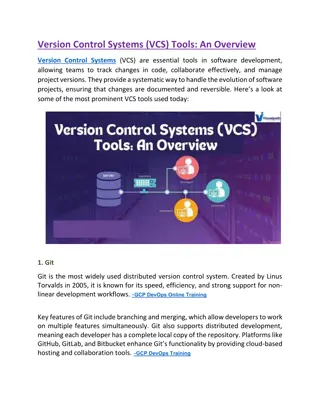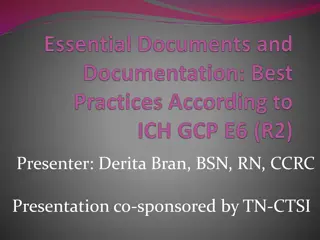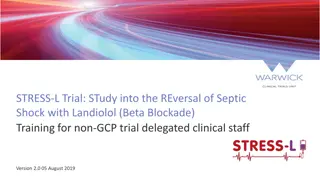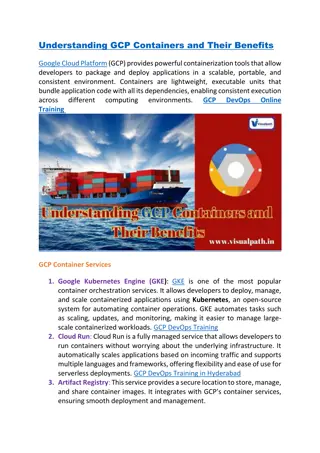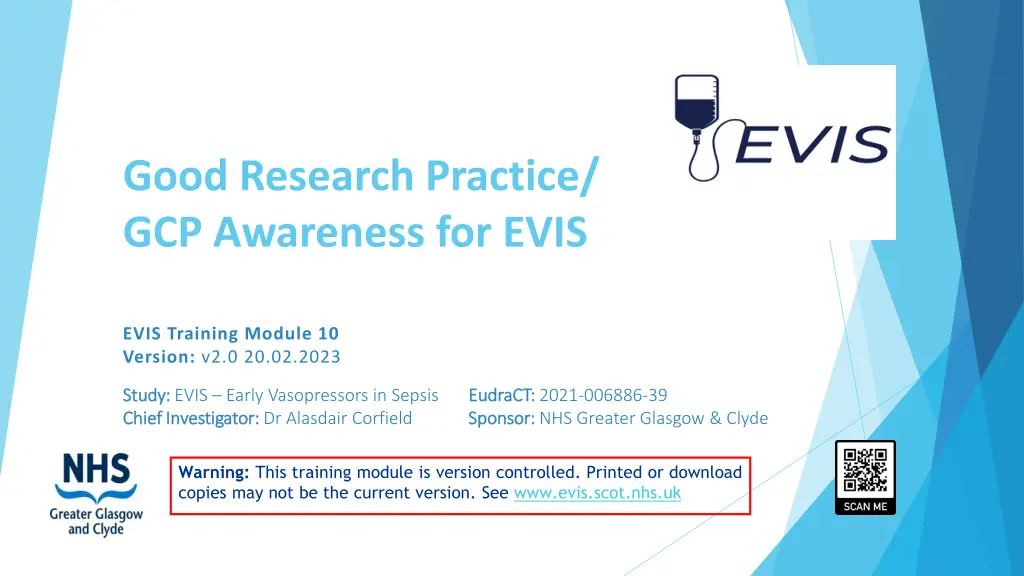
Understanding Good Clinical Practice in Research
Explore the significance of Good Clinical Practice (GCP) in research, highlighting its rules and regulations to protect patients involved in clinical trials. Learn about the history, necessity, and evolution of GCP standards such as the Nuremberg Code and Declaration of Helsinki.
Download Presentation

Please find below an Image/Link to download the presentation.
The content on the website is provided AS IS for your information and personal use only. It may not be sold, licensed, or shared on other websites without obtaining consent from the author. If you encounter any issues during the download, it is possible that the publisher has removed the file from their server.
You are allowed to download the files provided on this website for personal or commercial use, subject to the condition that they are used lawfully. All files are the property of their respective owners.
The content on the website is provided AS IS for your information and personal use only. It may not be sold, licensed, or shared on other websites without obtaining consent from the author.
E N D
Presentation Transcript
Good Research Practice/ GCP Awareness for EVIS EVIS Training Module 10 Version: v2.0 20.02.2023 Study: Study: EVIS Early Vasopressors in Sepsis Chief Investigator: Chief Investigator: Dr Alasdair Corfield EudraCT: EudraCT: 2021-006886-39 Sponsor Sponsor: : NHS Greater Glasgow & Clyde Warning: This training module is version controlled. Printed or download copies may not be the current version. See www.evis.scot.nhs.uk
Who should view this module? Aim: To provide an awareness of good practice in research. Target audience: Staff working on the EVIS study who are undertaking roles such as: o treating clinician o nurses preparing and administering the study medicines Note: This module is intended for those who will undertake activities detailed in the EVIS study protocol that are within their normal clinical remit/responsibility of the staff member. Staff who are delegated tasks on the site delegation log must have full GCP training 2
Good practice in research There is a set of rules and regulations by which clinical trials should be conducted These rules are called Good Clinical Practice or GCP for short This might seem a little confusing at first as the rules don t provide guidance on clinical practice as you will be used to seeing in your usual role Instead they are a set of rules for good practice in research and ultimately protect patients who are involved in clinical research. The following slides provide more information on GCP 3
Why do we have GCP? Atrocities in the past have lead to the need to safeguard participants in clinical trials. Examples include: Tuskegee 1932: monitoring syphilis with treatment denied Sulphanilamide tragedy 1937: 107 deaths linked to new formulation of a medicine and insufficient testing WWII Concentration Camps 4
Nuremberg Code - 1947 10 standards defined as criteria for judging those involved in biomedical research Central to this was the need for informed consent for those taking part in a study Became prototype for future codes. 5
Declaration of Helsinki - 1964 World Medical Association The health of my patient will be my first consideration Updated several times most recently 2013. 6
ICH-GCP - 1996 Europe, Japan, USA all had own guidelines International Council on Harmonization pharma companies Uniform standard created Amendment to ICH E6 (R2) June 2017 ICH 7
UK Legislation Regulations in the UK governing Clinical Trials: Medicines for Human Use (Clinical Trials) Regulations 2004 Statutory Instrument No. 1031 and Amendments 8
What does it mean for me? Legislation affects everyone who supports, conducts or is involved in any study, commercial or non-commercial looking at a drug in humans. 9
GCP Regulations No person shall - (a) conduct a clinical trial; or (b) perform the functions of the sponsor of a clinical trial , otherwise than in accordance with the conditions and principles of good clinical practice Medicines for Human Use (Clinical Trials) Regulations 2004 10
Requirementsof GCP Rights and safety of patient come first All people involved need to be trained. 11
Requirementsof GCP Approvals are required before the research can start Ethics MHRA These approvals were obtained for the EVIS study in 2022 Local Research & Innovation Safeguard patient confidentiality Use the EVIS study participant number on study documentation 12
Requirementsof GCP Must comply with trial procedures: The EVIS protocol provides information on why the research is being carried out and how to run the study There are resources to help you perform the tasks you may be asked to perform as part of the EVIS study. Ask your local EVIS research team Important: Protocol deviations need to be reported to the local EVIS research team 13
Requirementsof GCP Clinical information must be recorded and stored correctly: Accurate documentation is crucial in clinical trial Data collected as part of EVIS study is likely to influence future management of patients with Sepsis Good data collection ensures research is valid and reliable 14
Requirementsof GCP All clinical trials must be conducted to the Declaration of Helsinki: The health of my patient will be my first consideration Subjects must be volunteers and informed participants in the research project. 15
Principles of Consent Informed consent in the foundation of patient involvement in research Every patient must have a signed consent form Needs to be signed before any research related procedure can take place Consent is ongoing the form is the foundation not entirety 16
Consent in EVIS (1) Obtaining consent in EVIS may be a little more complex as some patients will lack capacity to consent due to their presenting illness There is specific legislation for obtaining consent in Adults with Incapacity. Consent may be sought from a personal (eg. relative of patient) or professional (eg. doctor or nurse) legal representative Once the patient recovers capacity to consent they will be given written information on the study that explains what has happened to them so far and seek their written consent for continued involvement in the study 17
Consent in EVIS (2) Only specifically trained and authorised research staff at your site are able to take patient consent for the EVIS study (initial consent and for recovered capacity) A doctor will be responsible for assessing capacity You could be asked to act as a: Witness for a patient who has capacity but is unable to sign the consent form themselves. The witness must sign the consent form as evidence that the information in the EVIS Patient Information Sheet was accurately explained to and understood by the patient and that consent was freely given. Professional legal representative (PLR) if a patient is too unwell to consent for themselves and a personal legal representative such as a family member cannot be reached. A Witness or PLR must not be connected with the study i.e. cannot be on the EVIS research team and delegated tasks at site. 18
Consent: Acting as a professional legal representative 1 Can you act as a PLR ask yourself these five questions. Are you: an EVIS investigator? a health care professional who is a member of the investigator s team. In other words you are part of the research team and are delegated study specific duties on the EVIS site delegation log a person who provides care to the patient under the direction or control of either an EVIS investigator or a health care professional on the research team employed by the sponsor in the capacity of managing EVIS trial A staff member who is not a registered healthcare professional such as a doctor or nurse. If you answer yes to any of these questions you cannot act as a professional legal representative 1. 2. 3. 4. 5. 1. Medicines for Human Use (Clinical Trials Regulations) 2004 Informed consent in clinical trials https://www.hra.nhs.uk/documents/294/informed-consent-in-ctimps.pdf 19
Consent: Preparing to act as a professional legal representative What does acting as a professional legal representative (PLR) mean As a professional legal representative you are acting on behalf of the patient When acting as a PLR remember: You must read and consider the correct professional legal representative participant information sheet each time as this information may change and be updated You are free to ask the research team member taking consent questions on the impact of EVIS study for your patient The informed consent given by you represents the presumed will of the incapacitated adult The interests of the patient must always prevail over those of science and society You can withdraw consent at any time for your patient without giving a reason and there will be no impact on their future medical care or legal rights 20
Consent: Acting as a professional legal representative If you are in agreement with your patient taking part in EVIS then you must sign and date the Professional Representative Consent Form If/when the patient regains capacity, a member of the research team will then seek ongoing consent from the patient using the Recovered Capacity process 21
Adverse Events Any untoward medical occurrence in a subject to whom a medicinal product has been administered Includes occurrences which are not necessarily caused by or related to that medicine Important to document in participant s medical records/inform Investigator and research team. The processes for reporting an adverse reaction to a medicine are different to those used in routine practice and are covered by the protocol 22
Principal Investigator (PI) Responsible for conduct of the trial at a particular site Qualified by education & training to conduct the study Ensures all approvals are in place prior to recruitment Supported by a whole research team which includes nurses, other doctors, pharmacists etc. 23
Non-compliance with the EVIS protocol (1) Critical that the EVIS study is conducted in accordance with the current study protocol. This safeguards patient safety and integrity of data collection Despite best efforts of all the staff involved unintended departures from the approved protocol do occur. Deviations may be minor or major but all have the potential to compromise patient safety and the data collected. 24
Non-compliance with the EVIS protocol (2) Important that any non-compliances with the EVIS study protocol or procedures are identified and the local research team informed Being open and honest will safeguard patient safety and data collected 25
Applying principles of GCP to EVIS GCP is in addition to best nursing and medical practice GCP applies from the start to the end of a patient s involvement in EVIS The EVIS research team are there to support conduct of the study at your local site talk to them if you have questions about GCP or any other aspects of the EVIS study no matter how big or small 26
Next steps Record your training on the EVIS Training Log See EVIS Training Matrix for additional training modules Want to know more: Ask your local EVIS research team Study website www.evis.scot.nhs.uk (or scan the QRS code) Study protocol Associated documents Training matrix (mandatory & recommended) Training modules 27









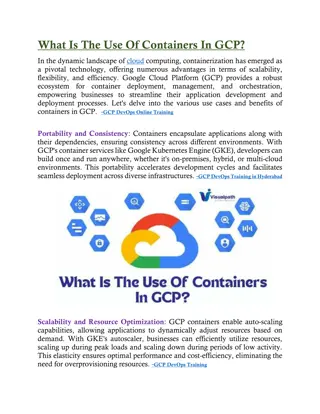
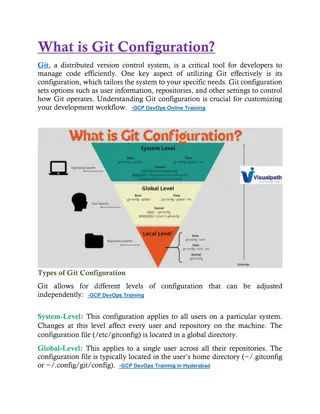




![Google Cloud Data Engineer Online Training in Hyderabad, Ameerpet [2024]](/thumb/89926/google-cloud-data-engineer-online-training-in-hyderabad-ameerpet-2024.jpg)
